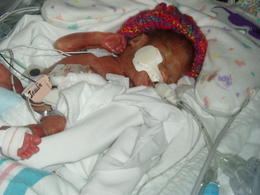Entry for April 18, 2006
Caitlin is 6 lbs exactly as of yesterday and 19 inches long!!!! Wow how she has grown. We had another home nurse come yesterday to weigh her and check in on us. I love it when they come because I like knowing her weight and for someone else to look at her. We go tomorrow for her peditrician appt tomorrow so I am pretty sure she will weigh just a little bit more.
Our Easter was nice , well somewhat lol. We were getting ready for church and all of a sudden Dillon broke out in a huge rash and his ears blew up like dumbos and were super red. His kneees started to get puffy along with lots of other parts!!! We couldn't figure it out because he hadn't ate anything out of the ordinary. We gave him some benedryl to see if it would go down and it did just a little bit so we thought we would give it a little bit more time. We went to church and when church was over we decided to take him to the urgi kids clinic just to be safe.
Well they decided he had hives also found a heart mumur and thought he could of developed rheumatic heart disease. WHAT!!!!!!Ok we just thought he had an allergic reaction to something we were not expecting all of this. Rememember Dillon had strep throat last Friday.
I am going to put at the end the explanation of the heart disease. Ok so after the urgi kids we had to go to the hospital to go get some labs drawn on Dillon to see what it was, oh forgot to add that he also had a ekg done to test for irregular heart beat, luckly he passed that one. So Dillon did not like getting poked was very upset by the time we got home it was after 6 pm!!! Poor Caitlin had to go with us so I had to have Jesus wait in the car with her so we wouldn't expose her to anything from the hospital.bleckkkkkkkkkkkk it sucked.
I got the call from the dr and she said Dillons test results came back within normal range and that he did not have the heart disease. Thank God, I was praying so hard that it was not that. We ended up going to see the peditrician the next day but not our reg one because our reg ped does not work on mondays so we got another one and he said he did not hear a herat mumur and that he just probably had a bad alleric reaction to somehthing, possibly the amoxicillian he has been taking for his strep throat. Weird thing is that Dillon has been on the antibiotics for 9 days so its weird all of a sudden it could be from that, but I am no Dr lol. Anyway we are going tomorrow to go see our reg ped and get a recheck so we have both Dillon's and Caitlin's appt tomorrow. Hopefully Dr can tell me exactly what the heck is going on.
Today we went for the eye appt for Caitlin to check on her eyes and the Dr said she was responding really well from the surgery thank goodness. I hate going to the eye Dr because they really do not know how to schedule well. I even got upset because I had Caitlin pre dialated so we wouldn't have too wait so long and still it took forever ughhhhhhhhhhhhhh. Oh well. Well thats our fun last few days , Dillon still is so rashed and kind of cranky and Caitlin is not so happy herself because her eyes don't feel good since they have to put those clamps on her eyes to exam them. Will report tomorrow how the kids appts went
Here is the explanation of the heart disease, its pretty scary considering alot of the symptoms Dillon pretty much had. How weird that just from having strep throat it could cause this!! Scary!!!!
What is rheumatic heart disease?
Rheumatic heart disease is a condition in which permanent damage to heart valves is caused by rheumatic fever. The heart valve is damaged by a disease process that generally begins with a strep throat caused by bacteria called Streptococcus, and may eventually cause rheumatic fever.
Who is at risk for rheumatic fever?
Rheumatic fever is uncommon in the US, except in children who have had strep infections that were untreated or inadequately treated. Children ages 5 to 15, particularly if they experience frequent strep throat infections, are most at risk for developing rheumatic fever.
Why is rheumatic fever a concern?
Rheumatic fever, an inflammatory disease, can affect many connective tissues, especially in the heart, joints, skin, or brain. The infection often causes heart damage, particularly scarring of the heart valves, forcing the heart to work harder to pump blood. The damage may resolve on its own, or it may be permanent, eventually causing congestive heart failure (a condition in which the heart cannot pump out all of the blood that enters it, which leads to an accumulation of blood in the vessels leading to the heart and fluid in the body tissues).
What are the symptoms of rheumatic fever?
The symptoms of rheumatic fever usually start about one to five weeks after your child has been infected with Streptococcus bacteria. The following are the most common symptoms of rheumatic fever. However, each child may experience symptoms differently. Symptoms may include:
Joint inflammation - including swelling, tenderness and redness over multiple joints. The joints affected are usually the larger joints in the knees or ankles. The inflammation "moves" from one joint to another over several days.
Small nodules or hard, round bumps under the skin
A change in your child's neuromuscular movements (this is usually noted by a change in your child's handwriting and may also include jerky movements)
Rash (a pink rash with odd edges that is usually seen on the trunk of the body or arms and legs)
Fever
Weight loss
Fatigue
Stomach pains
The symptoms of rheumatic fever may resemble other conditions or medical problems. Always consult your child's physician for a diagnosis.
Treatment for rheumatic heart disease
Specific treatment for rheumatic heart disease will be determined by your child's physician based on:
Your child's overall health and medical history
Extent of the disease
Your child's tolerance for specific medications, procedures, or therapies
Expectations for the course of the disease
Your opinion or preference
The best treatment for rheumatic heart disease is prevention. Antibiotics can usually treat strep throat (a Streptococcus bacterial infection) and stop acute rheumatic fever from developing. Antibiotic therapy has sharply reduced the incidence and mortality rate of rheumatic fever and rheumatic heart disease. Children who have previously contracted rheumatic fever are often given continuous (daily or monthly) antibiotic treatments to prevent future attacks of rheumatic fever and lower the risk of heart damage. If inflammation of the heart has developed, children may be placed on bed rest. Medications are given to reduce the inflammation, as well as antibiotics to treat the Streptococcus infection. Other medications may be necessary to handle congestive heart failure. If heart valve damage occurs, surgical repair or replacement of the valve may be considered.
Subscribe to:
Post Comments (Atom)








No comments:
Post a Comment